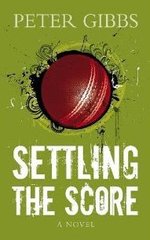Settling the Score
Martin Chandler |Published: 2012
Pages: 272
Author: Gibbs, Peter
Publisher: Methuen
Rating: 3.5 stars

I recall as a child reading Hugh de Selincourt’s The Cricket Match, and quite enjoying that, but the only other works of cricket fiction I have attempted to read were one called Testkill, to which Ted Dexter lent his name, and Bodyline – The Novel by Peter Wheeler. I remember being deeply unimpressed by the Dexter effort. My memory of the Wheeler book is dim now, but I know I only got through the first couple of chapters, so that certainly didn’t resonate with me either.
I vowed then that I would never read another cricket novel, and I haven’t, until now. Why did I make an exception for Settling the Score? I have to say I wasn’t keen, but a couple of well-timed communications from author Peter Gibbs persuaded me. At first I hadn’t twigged that this Peter Gibbs was the same PJK Gibbs who used to open the batting for Derbyshire in the late 1960s and early 1970s. He wasn’t a star by any means, and he played for the least glamorous county on the circuit, but I always looked out for his scores, because as a pre-teen cricket fanatic the couplet he was half of at the top of the county’s batting order, one DHK Smith being the other, rather appealed to me.
Some cricketers are always known by their initials, and for me these two certainly were, and the common thread to former England skipper MJK Smith, who was universally known as MJK, was probably the clincher. So I never actually learned what the “P” stood for – it might have been Paul, Philip or even Peregrine for all I knew or cared. If the book’s spine had displayed the name PJK Gibbs, rather than Peter Gibbs, then Settling the Score would doubtless have come to my attention rather more swiftly than it did. Which may all sound like a self-indulgent digression, but there is a point to it, that being the press release says that the story concerned a County Championship match in the 1960s, so at least I could rest assured that the author knew what he was talking about.
The above conceded such knowledge of itself would probably not have convinced me to read PJK’s book, but the press release also told me he was an acclaimed playwright, which didn’t necessarily make me any wiser, but the fact that he was the lead writer on ITV’s long-running 1960s rural police drama Heartbeat certainly did. The show was a great favourite of mine, and it is a great shame he chose to anonymise his name on the credits – “PJK” looks so much more impressive than the, with respect, rather bland “Peter”. Now that probably would have been enough to make me put the book on the pending pile, but if not the fact that it clearly impressed the sadly now deceased Christopher Martin-Jenkins and Frank Keating would certainly have done the trick.
But I got there in the end, and I have to say that having picked the book up on a cold February Friday I then had it finished by the end of the weekend. Having read it through and enjoyed it I now have to ask myself what to do now? Reviewing non-fiction books is easy, as you can spend half the review summarising the content, and then pick out a few highlights, and you’re nearly there – it really isn’t at all difficult. But you can’t really do that with fiction can you? Otherwise you’ll be accused of leaving a spoiler. But then the audience wants to know what the book is about, so I can’t spend the whole review waffling, or as I like to think of it, being discursive.
So on the basis even I appreciate you can’t review a book without giving at least a flavour of what it is about I’m going to play it safe and quote verbatim from the press release:-
Settling the score takes us behind the scenes of a County Championship match played in the late 1960s, during which the apparently mundane mid-table fixture turns into a story of bitter rivalry and betrayal both on and off the field.
Two brothers playing on opposite sides go head to head as rivals for a place on England’s winter tour. A night club incident spirals out of control and leads to the discovery of an affair which threatens to destroy team unity and end the career of a formidable but aging bowler. Meanwhile his young would-be replacement finds himself the centre of controversy over his suspect action. The narrative shifts from field to changing room, from night-time escapades to domestic angst – Settling the Score is the story of a team with more than the game to lose.
And there it is, a rather far-fetched plot to say the least, but then even I know that not all fiction is a gritty kitchen sink drama, and while the story may be a bizarre one, it is not totally beyond the realms of reality and, more importantly is, unlike its authors batting (on his own admission I might add) beautifully paced and well timed throughout. So I do recommend Settling the Score, even to those like me for whom the idea of a cricket novel is, at first blush, distinctly unappealing.
There is just question for PJK – I do recall that “t’ greatest bloody fast bowler who ever drew breath” ended his career at Derbyshire when you were there, and that he once had a cameo role in Heartbeat – did he inspire any part of the story or, perhaps, one of its characters?






Leave a comment